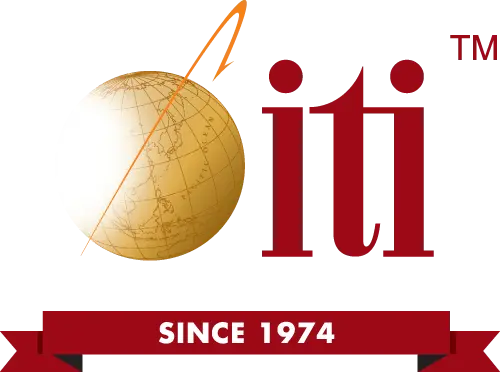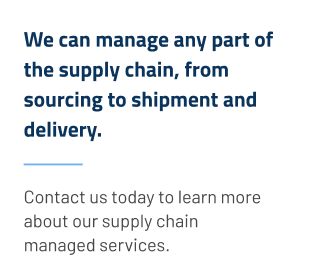
When the Price Isn’t the Price: Avoiding Surprise Costs With Global Logistics Solutions
In the context of industrial manufacturing procurement, what does the term “competitive pricing” mean to you? With our experience in global logistics solutions, we know that for some, competitive pricing means to match market-average pricing, and to others, it means to beat market-low pricing.
Because both opinions exist in the market simultaneously, no given supplier can ever be certain where their quoted prices will land. This conundrum leads some suppliers to artificially lower a price quote by foregoing necessary downstream costs, letting those costs “surprise” the buyer later in the project.
In practice, this pricing tactic tends to rear its ugly head in logistics and shipping cost arenas most often. Here, we shed light on surprise costs involved in global logistics solutions so that buyers can fend off or outright avoid these cost balloons.
Understanding Intentional Cost Exclusion
Let’s break the concept of intentional cost exclusion down into its decision stages so that readers understand what actions are in play.
- A buyer will request a proposal from a supplier, which will include a line item for logistics services (such as shipping, importing, etc).
- The seller knows there are multiple logistics costs, fees and taxes that should be included in this price as the buyer will ultimately need to pay them, but some costs may not be known at the time of order, may be variable or may be based on assumptions at this point in the transaction.
- Because of this cost uncertainty, the seller may elect to undervalue or entirely leave some of these costs out of their price quote. Sometimes this is done with good intentions to not overinflate the price with assumptions. Other times it is done to intentionally lower the price in order to win the order.
- Either way, the key element here is communication. If the seller communicates their pricing decisions to the buyer up front, the buyer is given the chance to set aside contingency funds to handle future cost changes or to direct the seller to include this contingency in their quote. If the seller does not communicate this and represents their deflated price as “all in,” the buyer is set up to receive unexpected price changes later.
- How these unknown and variable costs are handled makes all the difference between the buyer being able to make an informed decision about the transaction’s true total price and their risk exposure around that price. In effect, this single factor can turn a profitable transaction into a total loss, and worse, this fact wouldn’t be known until late in the game when the added costs trickle in.
While this pricing may seem purely predatory, there are justifiable reasons as to why it occurs. In some markets, it is customary to exclude external costs and have those billed to a buyer directly. Some sellers choose to only quote their direct fixed costs, billing variable costs at the final invoice down the road. In cases where external price spikes come as a surprise to the seller as a matter of force majeure, they have no choice but to pass those costs on.
In all cases, it comes down to contract language and communication between buyers and sellers, making sure everyone understands what costs are in, what costs are out and what costs may be expected to change. This clarity is an important part of global logistics solutions.
Surprise Logistics Cost Examples and Their Implications
To give readers an idea of the types of costs that seem to spring out of the woodwork in manufacturing procurement orders, here are several specific examples:
- Cross-dock fees: When shipments change carriers, transportation modes or route segments, this transfer may occur at a third-party logistics center that charges a cross-dock fee for the service. An initial shipping quote may not include these fees especially when actual routes are not determined at the time of order.
- HTS code correction fines: The government always gets its money, and one way the US Trade Commission gets its money is through the use of Harmonized Tariff Schedule (HTS) codes that determine customs duties charged on imported goods. Sellers may declare incorrect HTS codes that are caught and adjusted at customs, incurring heavy fines.
- Intermodal leg fees: Changing shipment modes can incur additional fees, such as when transferring shipments from ship to rail, or rail to truck. Mode changes can be unexpected, like those caused by disruptions or delays in standard routes.
- Deflated shipping rates: Some sellers will quote shipping rates using historic averages, inferior carriers, carrier base minimums, only partial route legs or other tricky variations that intentionally underrepresent real shipping costs. Sometimes this occurs unintentionally due to bad data or incomplete information, but the outcome is the same: a subsequent jump in shipping rates payable by the buyer.
- Customs inspection fees: The U.S. Customs and Border Protection agency has the right to pick random import shipments for intensive exams, which are the highest level of inspections designed to defend against the import of illicit goods. This exam interrupts a shipment, diverting it to a dedicated inspection center where it will be completely unpacked and repacked, running up additional trucking, storage and inspection fees.
- Storage, container and standby fees: Some global logistics solutions utilize storage and staging steps, rental or leased shipping containers, and add-cost standby time in their routes. Each of these items can turn into added costs to buyers, especially when the primary shipper is contracting such services of third parties unbeknownst to the buyer.
- Accessory fees and taxes: Unfortunately, almost anything can become an accessory fee added to shipment costs and passed on to buyers. Restricted access fees, fuel surcharges, carbon offset fees, local and regional taxes, class change fees, hazardous contents fees, and so on.
Global Logistics Solutions and Avoiding Surprise Fees
When engaging with offshore suppliers directly, buyers are always encouraged to do ample due diligence and coordinate details sufficient to hedge against surprise import costs. Unfortunately, sometimes these costs still materialize despite a buyer’s thorough efforts. This is where industrial sourcing agents can prove invaluable, using their experience and established networks to facilitate import engagements free of hidden costs.
Sourcing agents serve as a barrier between creeping costs and the buyer, staking their profit margin on their ability to hold supplier costs to quoted values or having to absorb surprise costs at a loss. For this reason, procurement agents are ultra-motivated to contract with only the most trustworthy of suppliers, and will issue contract documents that actively defend against third-party add-costs as a legal matter.
If engaging with a sourcing agent is not of interest, buyers can still take actions to hedge their risk of logistics add-costs, such as:
- Being specific with shipping instructions. Providing a destination address and date will allow for much better pricing than only providing a country, port, state or zip code.
- Using established shipping routes and carriers. Tap into mature shipping providers with proven track records of providing accurate all-in pricing, and who are using established routes and ports unlikely to tack on new costs.
- Reading contracts thoroughly. Look for verbiage that suggests cost exposure or third-party billing, and if unsure, add your own protective language to your order that assigns add-costs as the importer’s responsibility.
- Working with vetted and trustworthy suppliers. Vetted, high-quality suppliers should offer pricing that is reliable and all-inclusive and will not be offended if challenged to ensure this is the case.
- Performing active cost leveling. Maintaining records of past similar orders and their logistics costs provides a benchmark that new proposals can be leveled against, indicating if new quotes are relatively low from baseline and may have hidden costs looming.
Help With Global Logistics Solutions
At ITI Manufacturing, we have a passion for helping U.S. companies grow their business through global manufacturing. If your organization needs help with global logistics solutions, contact us today.






